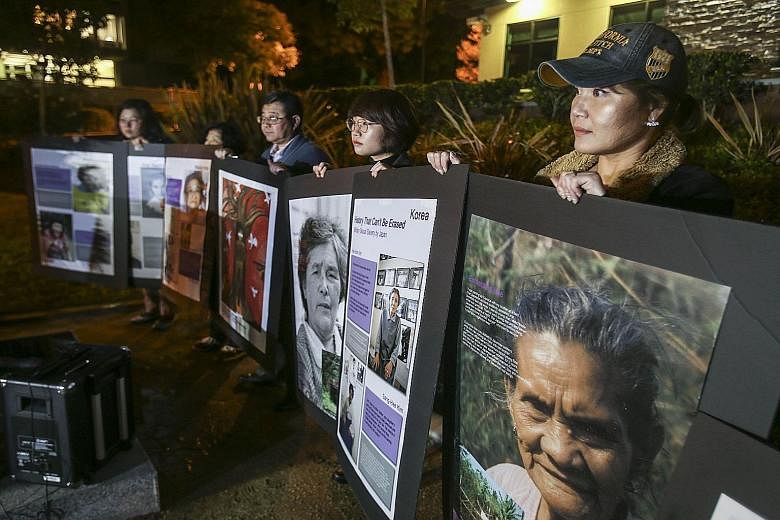Anger reverberated through South Korea last week, when a landmark deal struck between Seoul and Tokyo to end a dispute over wartime sexual slavery was announced in public. The Korean victims, who were not informed of it beforehand, were taken by surprise.
Madam Lee Young Soo, 88, the most vocal of the 46 known victims still alive, gave South Korea's First Vice-Foreign Minister Lim Sung Nam a two-minute shelling when he tried to belatedly explain the government's stand.
"Who are you? Why are you trying to kill us twice? Which country are you working for? Shouldn't you have informed us first (before entering into the agreement with Japan)?" she yelled. Her anguished rant encapsulates the key flaws of what is hailed by both countries as a major milestone and welcomed by the international community, but denounced by Korean critics as a "collusion" between the two governments to hastily end a decades-long political dispute.
The issue of comfort women, as they are euphemistically known, has been a sticking point in Korean-Japanese ties since it first gained prominence in the early 1990s, after a victim gave a public testimony about her sufferings and sued Japan for reparations.
Historians estimate that up to 200,000 women, mostly from Korea, were forced into military brothels.
A statement released by Japan's Cabinet in 1993, led by then Prime Minister Kiichi Miyazawa, to admit that coercion was used by the Japanese military and to express "sincere apologies and remorse" to the victims was upheld - although sometimes downplayed - by subsequent administrations.
But some South Korean leaders and civic groups have continued to demand that Japan apologise fully and take legal responsibility for its war crimes.
South Korea's current President Park Geun Hye, for one, had earlier insisted she would not meet Japanese Prime Minister Shinzo Abe unless Japan apologised for the comfort women issue. Her hardline stance softened last year only under pressure from the United States, which wanted its two key Asian allies to mend frayed relations.
The "final and irreversible" deal announced in Seoul on Dec 28 by the two countries' foreign ministers includes an apology from Mr Abe and 1 billion yen (S$12 million) in reparation.
But it drew criticism that the apology was not sincere enough and some detractors, including opposition members, found the compensation amount insultingly small.
Still, the people's anger is unlikely to derail the agreement that came at the end of a significant year that marked the 70th anniversary of the end of Japanese aggression in Asia and the 50th anniversary of normalisation of Korea-Japan ties.
The speed at which the deal was reached, barely two months after Ms Park and Mr Abe had their first summit, shows the extent of the willingness of both countries to resolve the issue before time runs out for the victims, who are in their late 80s and 90s.
Coming from Mr Abe, a nationalist who had previously tried to revise Japan's 1993 statement, the deal is a positive step forward, said Professor Lee Jung Hoon from Yonsei University's Graduate School of International Studies.
The accord was positively received in Japan - even though some local media tried to water down the agreement - and endorsed by the international community, with United Nations chief Ban Ki Moon, a former South Korean foreign minister, praising the two leaders and stressing that North-east Asia must build relationships "based on the recognition of history".
The US is certainly happy as it stands to reap the benefits of unity against a rising China that has become more assertive with its territorial claims and a volatile North Korea that appears to be boosting its nuclear arsenal - even testing what it claimed to be a hydrogen bomb this week. US National Security Adviser Susan Rice praised the "comprehensive resolution", saying the US is looking towards advancing trilateral security cooperation.
As for China, it appears not unduly worried about a strong alliance between its close friend South Korea and an ambitious Japan that is set to expand its military role abroad. Chinese media said the deal will not significantly change things in North-east Asia as China is now a major power in the region.
Prof Lee said China and South Korea have substantive bilateral relations, and the deal with Japan is "not something that signals that South Korea is turning its back on the Chinese government".
The deal is widely expected to increase high-level summits between Seoul and Tokyo, and economic, cultural and security collaboration between the two neighbours. Already, Ms Park and Mr Abe showed unity this week against North Korea's latest nuclear test, exchanging a phone call and agreeing to collaborate closely on sanctions. This is a welcome change from the animosity over the past few years, which had negatively affected business exchanges and roused feelings of distrust between the two sides.
There remain some issues that could flare up in the future, like their dispute over the Dokdo/Takeshima island and Japan's whitewashing of its World War II history. But Prof Lee said none of these issues can "replace the emotional sensitivity of what comfort women represent".
In South Korea, though, Ms Park will face an uphill task winning support and understanding from the Korean public. Opinion is divided on the deal, with only 43.2 per cent of 508 respondents in a survey by polling institute Realmeter expressing support, 50.7 per cent disapproving, and the rest unsure.
Protests against the deal are ongoing, with nearly 1,000 people turning up on Wednesday for a weekly demonstration outside the Japanese Embassy in Seoul to demand justice for comfort women that usually attracts only dozens.
As for the victims like Madam Lee, only time will tell if they can be persuaded to accept the settlement.


